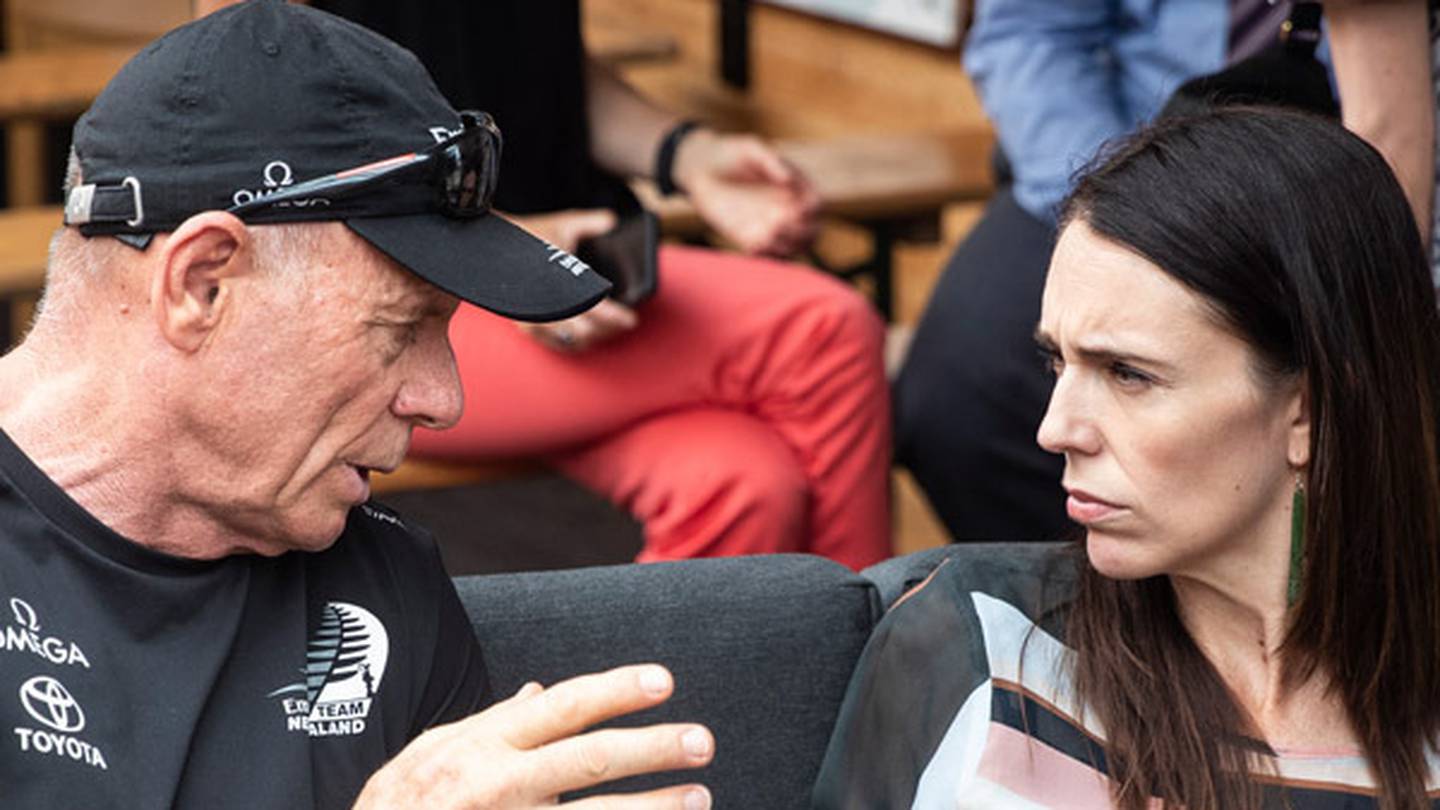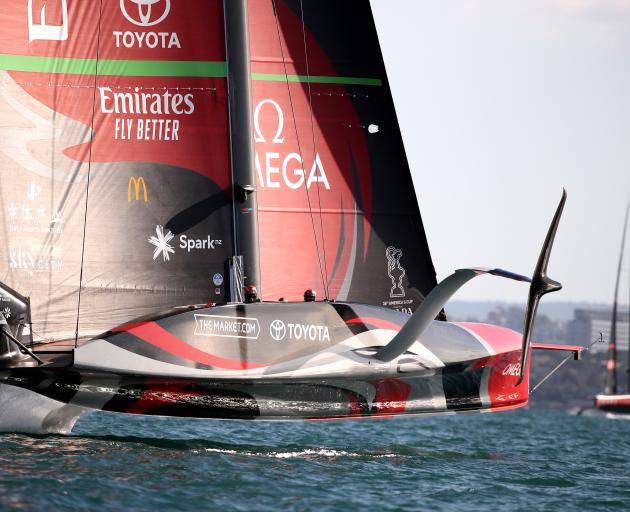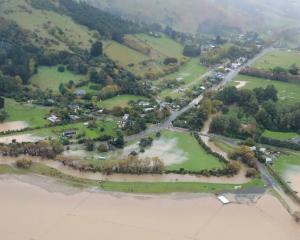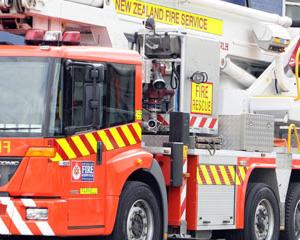
Three government-commissioned reports released this afternoon identify a string of factors, including Covid-19, a lack of challenging syndicates and overly high public investment generated "significant deficits" for Auckland and New Zealand.
Auckland's economy alone was left with a financial deficit of $146m following the event - with a financial return of 72 cents back for every dollar put in.
The reports say when "unpriced social, cultural or environmental effects" are taken into account, the return to the Auckland economy was 85 cents for every dollar spent, and 79 cents in the dollar to New Zealand - that would bring the loss to $156m.
Auckland Unlimited chief executive Nick Hill pointed to several positives of the event - including the most-watched America's Cup of all time, with a total global audience of 941 million people.
"Record numbers of people tuned in from around the world to watch the AC75s fly across the Waitemata, and New Zealanders came out in the tens of thousands to show their support. Those images will remain in people's minds for years to come, and we look forward to welcoming these visitors back when our borders allow."
Auckland Council revealed today its spend on the event was $92m higher than had previously been made public because it had brought forward spending on already planned works. The council says bringing the work forward will result in future savings of $67m.
Council had previously stated its investment in AC36 was $113m - but today those costs were revealed to be $215.2m.
"To ensure the safe and successful delivery of the 36th America's Cup, the Auckland Council group invested $215.2 million over four years across operating and capital expenditure," a statement from council's tourism CCO Auckland Unlimited said.
"This included $106 million spent on the development of key event infrastructure, and $14 million spent on city operations aspects such as transport services, crowd management and security, marketing and promotion and supporting peripheral events through the Summernova Festival."
The $92 million in fast-tracked council work included the removal of tanks in the Wynyard Quarter, upgrades to toilets, new biosecurity signage, extensions of CCTV and the relocation of SeaLink.
"While ultimately Tamaki Makaurau Auckland Aotearoa New Zealand were fortunate to be able to stage a safe and successful event during a global pandemic, it became clear early on that the event would be unlikely to return the investment made," the report, said.
"Fewer international challengers than originally forecast and the subsequent impact of Covid-19, including international border restrictions, has contributed to the event not being able to realise the expected return."

The first driver was lower than projected levels of expenditure by foreign entities and visitors. Only having three Challengers rather than the projected eight included in the original projection was significant.
"The analysis indicates that each Challenger spent around $30 million in New Zealand, on average, so an additional five Challengers would have injected around $150 million into the Auckland and New Zealand economies.
"Only 35 per cent of this expenditure would be considered a 'net benefit', so an additional five Challengers would have increased the net benefit by around $53 million.
"And while Covid-19 disrupted international travel at a critical time for the event, it is likely that international visitor numbers (including superyachts) would have been lower than projected in the absence of Covid-19 due to the lower-than-expected number of challengers."
The impact of Covid-19 was also considered part of this first driver of low visitor numbers.
"Despite the lower-than expected number of Challengers, there was a high level of interest in the event among international sailing enthusiasts and high-net worth individuals. However, the border restrictions caused by Covid-19 prevented most of these people from visiting New Zealand," The Fresh Info 36th America's Cup Impact Evaluation report said.
The second driver for the $292.7m loss to the New Zealand economy was higher than projected public investment.
This "resulted in higher overall hosting costs for Auckland and New Zealand", the Fresh Info report said.
"The original economic projection was based on a $200 million investment by local and central government, while the actual investment was $348.4 million over four years plus the public funds costs of $74.2 million," the report said.
"The variance was mainly caused by planned capital projects being brought forward by Auckland Council to align with AC36 projects (to reduce future disruption and duplication of effort), the rescoping of some of these projects to meet America's Cup requirements, and the final cost incorporated operational and leverage expenses that were not included in the original economic projection."
Auckland Council finance and performance committee chair Desley Simpson told The New Zealand Herald following the release of the reports today it was still "fantastic" to host a successful AC36 in the "midst of a global pandemic".
Simpson said there was little that could be done about the economic outcome of the event once Covid-19 struck.
"At the end of the day, where in the world did you have an event, full stop? Look at the Olympics," Simpson said.
"Toyota have pulled out of the Olympics but I think there's a general feeling in the sporting community that the show must go on. I think there was an element of New Zealand that wanted it [AC36] to happen. "
America's Cup Events report more positive
In contrast to the Auckland Unlimited and independent Fresh Info cost benefit reports, an evaluation of the benefits of AC36 was also released by America's Cup Events (ACE) today that painted a more positive economic picture.
The chief executive of ACE is Grant Dalton, who is also head of Team NZ and oversaw the running and everyday logistics of the event in Auckland's Viaduct from December 2020 to March 2021.
The 110-page ACE Limited Final Event Report describes a "world class" broadcast and an event that fostered an "extensive positive international profile" that "delivered an unrivalled showcasing of Auckland and New Zealand".
The ACE report cited there had been 860,000 visits to the Cup Village between December and March.
ACE gave a rundown of $45m in total spend that included $26m on administration, $3.7m on TV production, $2.4m on the Race Village, $1.1m on social media, $629,000 on website costs, and $7m on "challenger or record event costs".
However, the report cites "conflicting information was often received" between various government agencies and interest groups when it came to managing the Covid-19 risk for the event.
"There was also mixed messaging from agencies as to which agency would be the approving or regulatory authority when the plan [Covid-19 Response Plan] was implemented, which was frustrating," the report said.
This dysfunction also extended to ACE's dealings with Auckland Unlimited in dozens of regular "unproductive meetings".
"Unfortunately, due to the number of people who attended and the fact that they were led by Auckland Unlimited, which was not responsible for delivering the event, they became very unproductive, and required outcomes were not able to be achieved."
The AEC report also referenced a problematic working relationship with the Challenger of Record (COR) Team Luna Rossa Prada - which was revealed to have invested over $150m in AC36.
Unfortunately, the Event Concept - He Waka Eke Noa – We are all paddling in the same waka – was a very good intention, but remained in the words; COR and ACE were rarely in the same waka," the ACE report said.
"A direct line between COR, the hosts and the city would have been very helpful indeed, and not involving COR in the negotiations, meetings and decision-making process with the hosts and the city was a major mistake: this situation generated a rather conflictual and complicate relationship.
"Finally, the treatment of COR by Panuku in relation to the AMG structures on Halsey Wharf left a sour taste in the mouths of COR."
Comments
Could have been ok if it wasn't for covid. Unfortunately there was too much aggro between the teams and Team NZ must take a lot of responsibility for that. They have blown it for next time.
Wonderful showbiz. Economic disaster, on public money.
I’ve never supported funding this sporting event and have always doubted the dubious claims to potential return on investment. I doubt COVID 19 had an impact. This is just more evidence of the outright fraud that “trickle down” economics represents.
We should not be funding any sport at this level and telling nurses that the wallet is empty.













